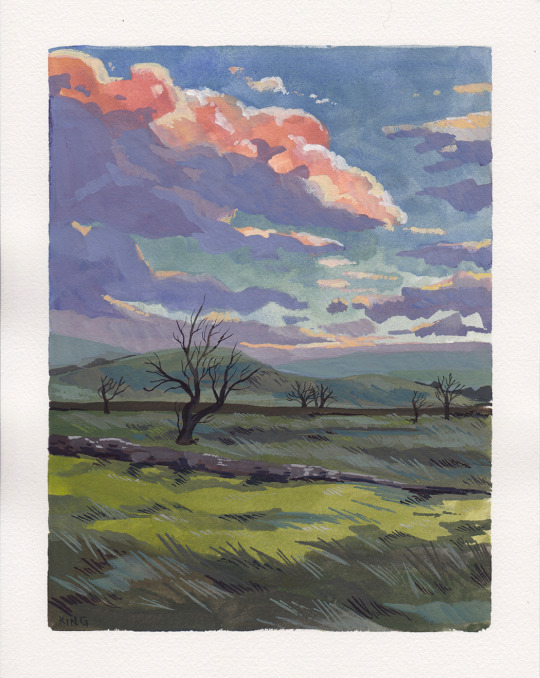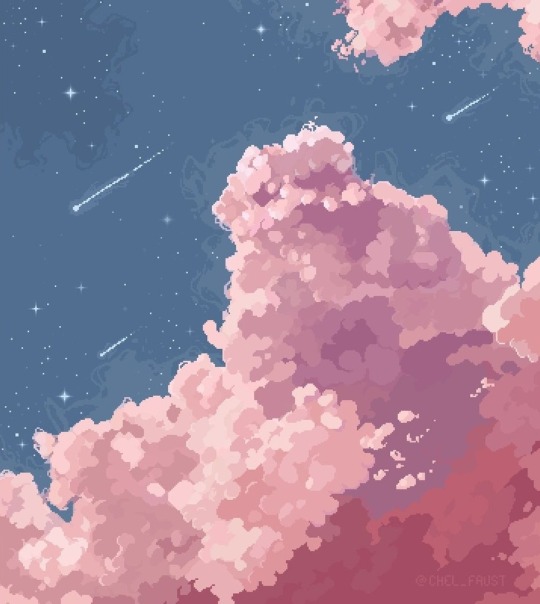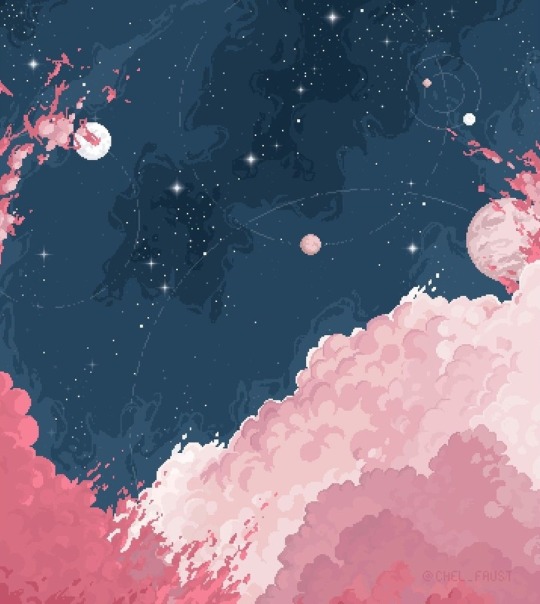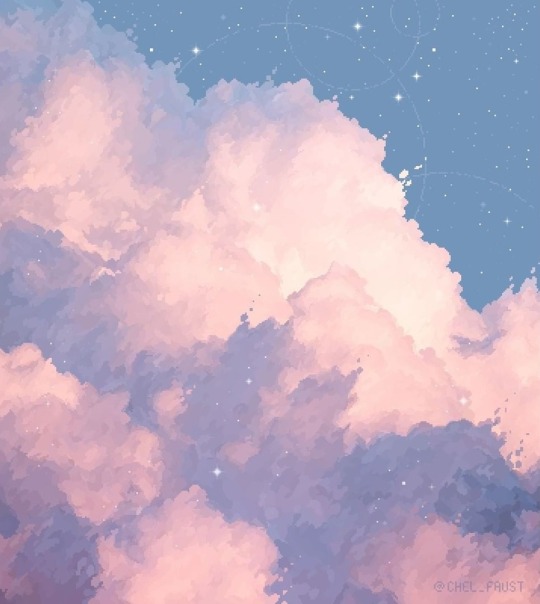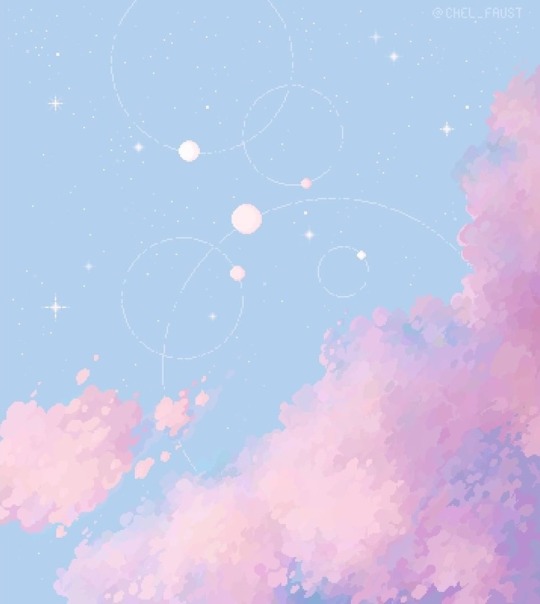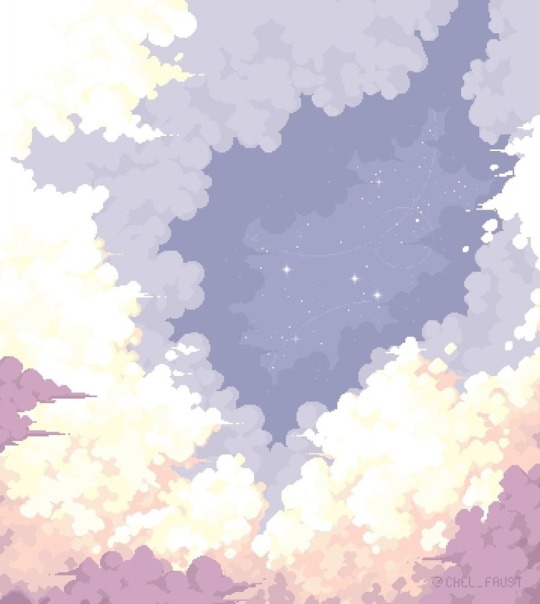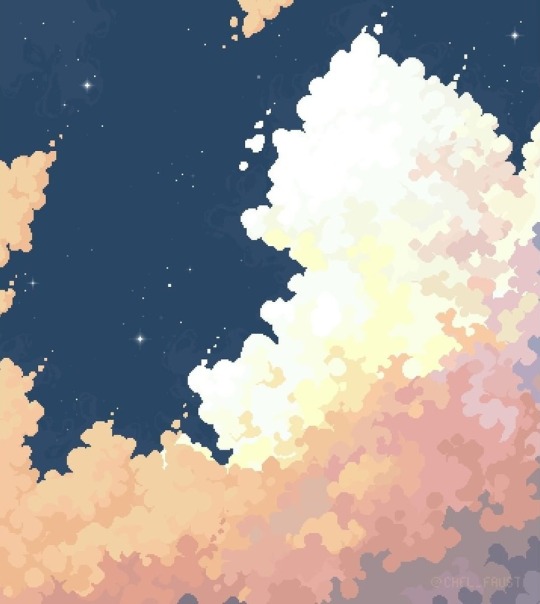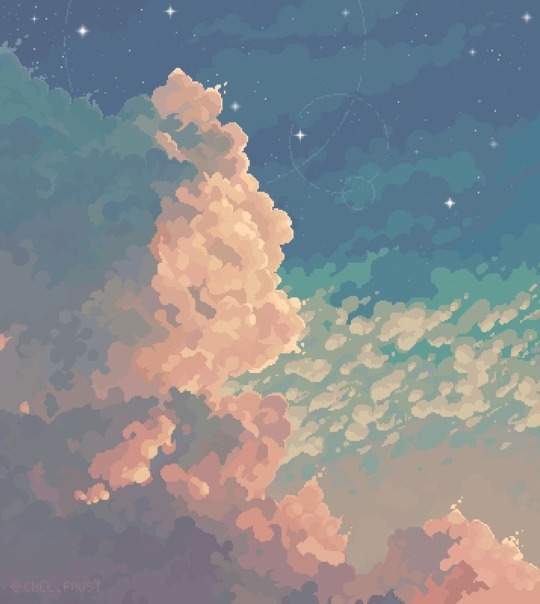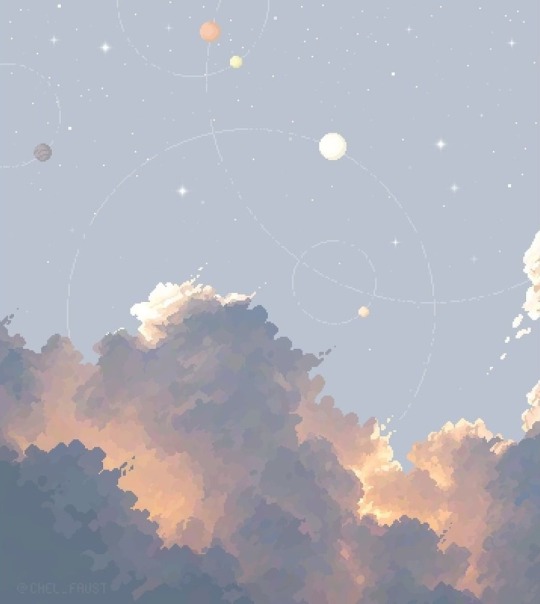A blog of the musings and tepid takes of a restless and overthinking mind. What to expect: movies, culture, fun facts, history, art, books, queer stuff, mental health, politics Oh and I draw sometimes
Don't wanna be here? Send us removal request.
Text

From the ruins of war to the weight of exile, Mohamad's story is one of resilience, sacrifice, and unshakable hope. He managed to save what remained of his family, but the pain, debt, and distance still haunt him. His only wish now is to reunite with his sister and children, the last pieces of his shattered world. So far, $7,312 has been raised thanks to 486 generous donors. Your support can help them get reunited. Donation Link (GFM)
5K notes
·
View notes
Text
Nausicaä of the Valley of the Wind: Why This is My Favourite Ghibli Movie
CW: Major high-school English teacher vibes ahead. Proceed at your own risk.
Nausicaä of the valley of wind is a story of the titular character Nausicaä and her being a bridge between the world of humans and nature to bring peace, thus fulfilling an ancient prophecy.
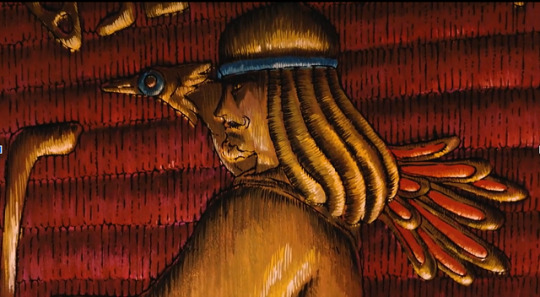
Nausicaa is the princess of the Valley of the Wind. The film begins with her walking and exploring the Sea of Decay, an area with toxic air, plants and fungal spores. She collects some spores and finds the hard molten shell of an Ohmu (gigantic blue-blooded trilobite-looking creatures), which her people use to make weapons and tools. As the name suggests, the Valley of the Wind is a civilisation that depends on and bases their culture around wind, which one can see through an abundance of windmills and gliders, including the one that Nausicaä rides. They are shown to be peaceful people who do not interfere with the politics of the warring human kingdoms or disturb nature. Nausicaä in particular is shown to have a special gift with animals—from calming Ohmus to having a pet fox-squirrel. As the existence of the kingdom depends on the sea wind that shields them from the effects of the sea of decay, there is a general reverence towards nature and its other members such as the Ohmus, that are often referred to with honorifics.
This was an element I liked: the symbolism goes deep in this film; for example, with the nature of wind—it being the very breath necessary for life is contrasted with its other face, through toxic spores in the sea of decay capable of killing anyone who inhales it.
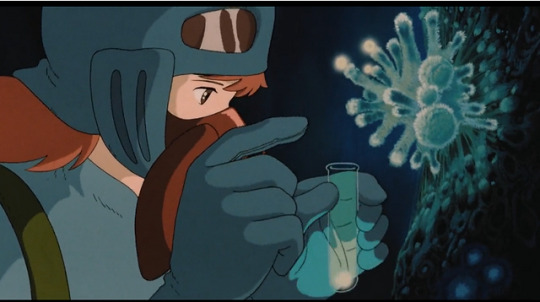
It is revealed that humans had built The Giant Men, weapons so dangerous—not unlike our atomic bombs as shown through the characteristic mushroom cloud—that the destruction caused by the war had unleashed the fury of the Ohmus, an otherwise gentle species. They wiped out entire civilisations and where they died, the Sea of Decay grew on their decomposing corpses, showing how all life is interconnected and that even in death the rage of the Ohmus, and through them the rage of nature, wouldn't subside. It is then that the viewers find out that this is not some far-off planet, but a post-apocalyptic future on earth.
New species of plants and fungi made the Sea of Decay their habitat—nature and life always find a way. It is implied that the humans lost the war referred to as the Seven days of Fire, but the truth is that it is not a war that can ever be won. Even if you win the war against nature you lose. As the story progresses, we see that the plants and fungi that Nausicaä collected from the Sea of Decay are actually trying to purify the soil and water—nature holds no grudges but only seeks balance.

The seventh of the Giant Men, a sentient atomic bomb if you will, apparently hid underground for a thousand years until the kingdom of Pejite found it for use against their enemy, the Tolmekians. They both remain oblivious to the sheer destruction that can be caused by this Giant Man and they don't care either. Despite the balance between humans and nature being a delicate one, instead of trying to rebuild together, they justify to themselves that the war is necessary for self-preservation and to put humans back on top of the food chain.
In their hubris, the Tolmekians and their princess Kushana believe that with the help of their superweapon they can destroy the Sea of Decay despite knowing that it will trigger the wrath of the Ohmus. The Giant Man however is not complete and hence, though the devastation is great, the final giant man dies and all that remains to be done is to calm the wrath of the Ohmus.
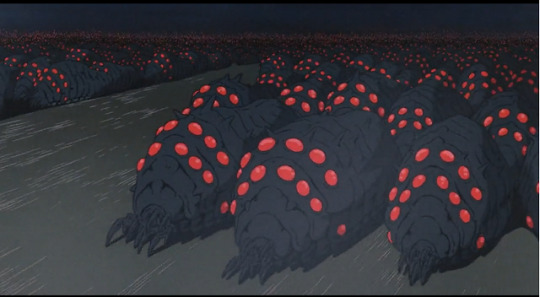
Nausicaä saves an Ohmu child who was injured by Tolmekian soldiers to lure the Ohmus into a war. She saves the baby Ohmu and sacrifices her own life to calm the sea of maddened Ohmus. The now-calm Ohmu then revive Nausicaä, symbolising the mystical healing power of nature and its ability to support and create life.
Nausicaä is an excellent protagonist, and how the trope of the chosen one is utilised is beautiful and full of symbolism. Right from the get-go, we see her being inquisitive and brave. She is willing to defend her people but not through violence. And it is made abundantly clear that her avoidance of violence is not due to any lack of strength; when she strikes down the soldiers who killed her father, rather than feeling any sense of pride (as one might expect from a character not used to strength), it sickens her. She shows understanding even towards Kushana, whose men took over her kingdom. She sincerely loves and respects animals and plants.
There was a prophecy among the people of the valley of wind that a person clad in blue over golden fields will save their kingdom and bring peace. And towards the end of the film, Nausicaä's clothes becoming blue with the blood of the baby Ohmu she saved and the golden fields being the tendrils of the Ohmus healing her is poetic to say the least.
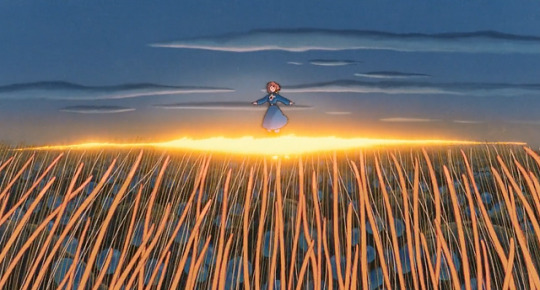
In addition to a good female protagonist, we also get a powerful female antagonist in Kushana, who starts out as a one-note expansionist ruler, but it is revealed that she lost her limbs and got severely maimed by the sea of decay, motivating her to destroy it once and for all. Proud and arrogant, sure, but she has a motive beyond just wanting power and possesses some form of a moral code. In another story she could be the protagonist bravely defending humanity against the evil, alien-esque trilobites and spores.
It was a unique and meaningful choice on Miyazaki's part to symbolise nature through the Ohmus—alien-looking giant insects—instead of something cute and fluffy. Oftentimes humans care more about the conservation of animals that they find cute (pandas over, say, Panamanian golden frogs), but an animal doesn't have to appeal to human aesthetics to be worth conserving.
Absolutely not to be missed is the breathtaking soundtrack by Hisaishi. There are symphonies, techno music, sitar-like instruments and a child's humming, all elevating every scene to give a moving experience.
Ultimately it is an ambitious story that aims to deal with themes of coexisting with nature, the futility and dangers of war, and of how innocent children who should live carefree lives are dragged into it and made heroes. This film is often categorised as falling into the genre of Solarpunk: a literary and artistic movement that centres around building a sustainable future interconnected with nature and community. Although this film does depict violence and wars, it ultimately shows a peaceful future is possible.
Truly a masterpiece. 9/10.
#analysis#culture#short essays#media#anime#fictional characters#film#ghiblicore#studio ghibli#musings#movies#solarpunk#climate change#nuclear#environmental issues#environment#miyazaki#feminism#review#character analysis#nausicaa#animanga#animals
240 notes
·
View notes
Text
Hello, I am a writer/editor for a blog. So if you like what and how I write(if you haven't you can find some things I've written on my account), please do visit. It's mostly reviews of movies, series, anime etc. We are new and will appreciate engagement.
You can also suggest any movie or series you'd like me to review.
Thank you!
#musings and analyses#film review#anime#animanga#review#culture#film#series#studio ghibli#ghiblicore#fictional characters#media#short essays#analysis#cinema
2 notes
·
View notes
Text
reblog to let people know you were here before the great twitter migration
4K notes
·
View notes
Text
Diane Nguyen, a millennial heroine
(mostly spoiler-free)
Diane Nguyen from BoJack Horseman is one of my favourite characters of all time largely because of how rare it is to find such a multifaceted and layered character who lends striking verisimilitude to a world of talking bipedal horses and cats.
Since her introduction in the pilot episode, she is shown to be smart, introverted and opinionated, who won't shy away from voicing them. Diane is in many ways, the moral compass of the show reminding the characters and viewers what is the right thing to do. She holds everyone, including herself, to high moral standards. But in a world with no objective morality, one can only do their best as is acknowledged by Diane. And it is undeniable that Diane tries to stick to her moral philosophy-
"There's no such thing as "bad guys" or "good guys." We're all just guys who do good stuff sometimes and bad stuff sometimes. And all we can do is try to do less bad stuff and more good stuff, but you're never going to be good. Because you're not bad."
I'd argue she is also the audience's stand-in as she is a complete Hollywoo outsider stuck in a world of celebrities. She notices normalised bad behaviour in the industry and tries her best to shake the numbed insiders to reality, although, often to no avail. She is sensitive to the state of affairs and struggles to find a place and meaning in the world.
Diane's arc touches upon how creativity and personal fulfilment are crushed under capitalism. While working for Girl Croosh, a comically pink-washed company, she is routinely pressed to write vapid, clickable articles instead of the more serious issues she wants to write about.
But no one, not even Diane herself, can meet her moral standards, as we see with each passing episode. What is revealed is a deeply flawed character, some evident through her outbursts and some in more subtle ways through her internalised beliefs. And thus Diane truly embodies the millennial ( and Genz) archetype- a duality of woke-ism and solipsism.
But we see that her self-absorption can at least in part be attributed to her childhood when her attempts to be a part of a community by trying to connect to her Vietnamese roots were neglected by her parents. And by the time she visits Vietnam herself, she's in her 30s and it dawns on her that she's too divorced from those roots, an experience children of immigrant parents are only too familiar with.
Throughout the show, we see through Diane that doing the right thing is systemically made inaccessible and one only really has two options - lash out or go numb. And the tragedy is that your choice is, at the end of the day, insignificant. But we also see how her worldview makes her feel entitled to do things without consulting with others she believes she has a moral high ground over and often overreacts when called out.
A combination of these factors gives Diane a paradoxical perspective. And this is pointed out by BoJack, although unintentionally when he tells Diane she fetishises her sadness. It is shown through multiple examples throughout the course of the show that Diane struggles with accepting gifts or help even from her loved ones- even something as simple as a warm jacket from Guy. She justifies it to herself by making excuses or being overly critical. One can understand this behaviour better when one looks back to her neglectful parents that made her internalise the idea she didn't deserve anything good unless she proved herself in some capacity.
In the episode- Good Damage, we get even more insight into Diane's childhood and the inner workings of her mind. She has been telling herself this story that her trauma has a meaning and a purpose that she can unleash into the world through her writing. She tries to find some solace in the archetype of a tortured genius as a means to cope with her profound dissatisfaction with her life. We also see her stop taking her antidepressants because she thinks (unfortunately like many others) that the medication would make her lose her spark™. She thinks that being a children's author is beneath her even when she is good at it and the books were successful. She desperately wants to write her "serious" book of essays, despite how difficult it is for her because not doing so would mean that all her damage won't be "good damage", but just damage.
Though later the conversation with Princess Carolyn makes her realise that looking for a grand narrative is pointless as there is no grand narrative and that she can achieve her dream of inspiring young girls through a happier and easier way through books about a girl detective. This metanoia is illustrated in the series finale with Diane not wearing the characteristic green jacket she wore since the first episode, anymore. She has let go of the jacket, a token of her past, and is finally at peace with herself, giving all of us hope that we might eventually get there as well.
#analysis#culture#musings#short essays#feminism#social media#media#capitalism#current#psychology#bojack horseman#long post#feminist#mental health#trauma#tropes#fictional characters#netflix#sociology#society#musings and analyses#millennials#gen z#existentialism#nihilism#fiction#animation#asian representation#asian#neoliberalism
30 notes
·
View notes
Text
Lady Eboshi & Girlboss Feminism
When I first saw Princess Mononoke, I was really impressed with the portrayal of Lady Eboshi, a personification of humanity and technology. Lady Eboshi is the primary antagonist in the story and unlike a lot of Western media allegories that tend to paint humans and technology as being purely bad (especially when the theme is that of environmentalism), Miyazaki's films tend to show a nuance that is much more real in spirit despite the often magical setting. And Princess Mononoke was one of the first films that I saw to illustrate that.
Lady Eboshi is shown to be this strong woman™ character- tough, confident bordering on arrogant, trained in combat, and a great leader for her people of Irontown. Due to the mining of iron, large swathes of the forest had to be cleared which angers the many spirits of the forest, like the boar and wolf spirits, who retaliate against the villagers. And this is the context in which the viewer is first introduced to Lady Eboshi- when the wolf spirits ambush her party carrying rice to Irontown. And so, she is determined to kill the forest spirit because that would stop the interference in her path to further develop her town. We find out she already shot and killed the boar spirit who then went on to give the curse on Ashitaka's hand.
Despite her tough and audacious exterior, Eboshi is also shown to be kind and not someone who uses fear to rule(as is often the trope in the case of strong female villains). She rehabilitates women from brothels giving them a job and making them independent. She also takes in lepers and tends to them and gives them a job too. She is a girlboss. In another story she could have been the hero trying to defend her people and trying to bring progress.
But it's not that simple. She shows the positives that technology and progress can bring- women's empowerment and a better quality of life for everyone, but fails to understand that going after nature only hurts everyone in the long run.
And this is where we come to girlboss feminism. Although definitions vary, one of the commonly agreed upon feature is keeping the system as is, but just bring more women into the equation. Things don't change for the better- climate crisis and oppression under capitalism remain more or less the same, but now in pink✨. It's the limitation of not having a long term perspective, no critical examination of the system and treating symptoms instead of the disease. Think of the fast fashion brands founded by the Kardashians/Jenners pour example- same system, same people at the bottom, but a new brand name. Eboshi is definitely not completely evil, but her intent to kill the forest spirit only furthers the cycle of hate and destruction.
The story also illustrates another pitfall of girlboss feminism through the politics in human world. One of the other reasons Eboshi is killing the forest spirit is for the Emperor, in exchange for protection against Asano's forces who have surrounded Irontown; also, she is followed around by Jigō who is duplicitous and selfish, willing to backstab Eboshi any moment. This illustrates how girlbossism will hit a ceiling in empowering the very women it sets out to help. It merely expects women to 'man up' and will even reward her for that, but only until there isn't a serious threat to the status quo. And thus a girlboss can only be as successful as this hierarchy allows her to be.
Finally and on a more hopeful note, one could interpret the forest spirit biting off Eboshi's arm as biting off the toxic components of this girlboss movement, leaving behind Eboshi who is now transformed and determined to build back a better Irontown once again. This acknowledges the positives that this movement has brought and can bring in the future, while also reminding to get rid of the outdated ideas for a more sustainable future for everyone.
Lady Eboshi is one of the most iconic characters in the Ghibliverse, and I absolutely love her, so this has been fun.

#analysis#culture#musings#short essays#feminism#social media#sociology#media#girlboss#studio ghibli#ghiblicore#musings and analyses#capitalism#anime#nature#environment#environmental issues#climate emergency#forest#womenempowerment#media and culture#film#critique#film critic#movies#princess mononoke#criticism#climate change#animanga#animals
22 notes
·
View notes
Text
The Limitations of the Free Speech discourse (Part II)
Last post was about how the underlying motivations and values are quite different for different people when it comes to the purpose of free speech - individual liberty or good for society. These two positions are not opposites with no overlap, in fact many times they are in agreement, but they differ enough times for the free speech vs cancel culture/ political correctness debates to crop up every day on media.
But let's go down to basics. What is right to free speech? The common understanding is that it's the right to voice your opinions and ideas without being put behind the bars or executed for it. This, however, is quite broad and vague and only talks about the government interference with the speech. Private entities can have their own rules. Plus there are already legal exceptions put in place for hate speech, false advertising, doctor-patient confidentiality, perjury, defamation etc. So already we can see that free speech is not some absolute truth of the world. How each of these exceptions are interpreted is however subjective and depends on the government ideology. How well each of these laws are enforced is also another issue out of scope of this post.
But no one being "cancelled" is being put behind the bars, or at least the cancellation has little to do with any legal action. So, surely free speech is alive and well, right? Riiiiight?
* Nervous chuckle *
Here is where we come to why we think freedom of speech is important and the flaws in our understanding of it and the implications of those flaws.
We tried monarchy for a very long time, but after multiple wars waged by a bunch of inbred idiots, most people were like hey maybe absolute power in the hands on one individual is not great. Consequently, democracy became the new "it" form of government. But it is only useful as long as the populace stays well informed to make informed decisions through their votes, and also have the power to hold those in power accountable. Hence free speech is not only important for the press to inform the citizens of the state of affairs, it's also important for the citizens in turn to voice their interests.
But notice that for this system to work you need to prioritise two concepts simultaneously- right to free speech and right to information. These two are like the archetype of twins in mythology, closely related albeit distinct from each other. Kill one and you kill the other. So in spirit it is the flow of information that is supposed to be free from interference.
So when many broadcasters (individuals or companies with a large following) complain about getting "cancelled" by being de-platformed, they are not talking about their right to free speech, instead they are talking about their right to reach an audience (and thus have that free flow of information). Before you scoff at this idea, keep in mind things like net neutrality hinge on the same arguments.
Now whether a speaker is muffled while trying to speak or their audience are made to wear earmuffs or a soundproof wall is erected between the two, the effect is the same and goes against the spirit of free speech.
But when we don't understand this, we fall into shallow interpretations of the meaning and point of free speech. And we fail to see how speech has in many senses never been free in many covert and sinister ways even in modern history even in liberal democracies. For eg. anything that challenges the status quo has always been treated with hostility or ridicule (if they even managed to be featured anywhere in the first place). For decades no one could criticise capitalism on national TV without being mocked or accused of being a communist.
There are other serious limitations in the way we commonly understand free speech. I have seen relatively liberal celebrities saying we should counter free speech with free speech and change people's minds that way, but the way social media (where people increasingly spend their time, get their news, have discussions and go for entertainment) works is by curating an echo chamber for the user isolating them from voices outside. The "good" or "factual" free speech will probably not even appear on the screen of the user who's already consumed a bit too much of the "bad" free speech.
The free flow of information doesn't exist and has never existed and that's a problem (even more so when misinformation can travel so fast). So, yea I agree when a bunch of comedians (intentional or otherwise) say free speech is under attack, except I am talking about govt/ corporate propaganda, attack on net neutrality, the self censorship of the press to avoid backlash or even the recent cancellation of CN shows from HBO Max. I am NOT whining about having to use the goddamn pronouns.
#analysis#culture#musings#short essays#social media#sociology#musings and analyses#us politics#politics#cancel culture#canceled#free speech#freedom#current#capitalism#long post#essay#media#news#joe rogan#conservative#progressive#liberal#1st amendment#first amendment#democracy#feminism#critique#cartoon network#hbo max
2 notes
·
View notes
Text
The Limitations of the Free Speech discourse (Part I)
It seems like every other day that I see certain politicians, celebrities, "intellectuals" and random dudes on the internet decrying cancel culture or political correctness and claim how it is killing free speech. And I've seen not just conservatives but also relatively liberal people say similar things. And that led to some musings and overanalyses(ba dum tsss) in my mind.
Now there have been many who have made counterarguments, explaining how cancel culture does not stop free speech, but is instead a consequence of the speech of the "cancelled" person and how the public is simply using their free speech to protest against the cancelled. Other arguments include saying YouTube or Twitter or any other social media site is a private space run by private companies and they have all the rights to kick someone out who is not following the terms of use of that site.
But there's something in the discourse around free speech that is very rarely ever asked about or discussed. And that is - why do we need free speech?
People who decry cancel culture and are thus proclaimed to be the valiant protectors of free speech often talk about free speech as if it is something divinely ordained, and that trying to put any restrictions on that is somehow blasphemous and will promptly lead to the fall of Western civilisation and lead to an Orwellian dystopia. But why?
And once you keep this question in mind while observing the free speech discourse, you will see immediately that there is an underlying fundamental disagreement in the philosophy of free speech. Now there is a lot of nuance to be had, but broadly speaking there are two groups of people - one who think that right to free speech is an end in and of itself, and another group that thinks free speech is a means to an end; the end being a better society or functioning democracy etc.
And when these two groups argue without realising or acknowledging that the underlying assumptions and values are different, the discourse goes nowhere, even if both parties are acting in good faith (which isn't always the case either).
So let me talk about the first group, those who think free speech is an end in and of itself. This group includes your loveable Rowan Atkinson and Stephen Fry types and the libertarians. While this group also often sites how free speech is important for society, the good of the society isn't the primary motivation for this group. It is more about the individual who should have as few restrictions on them as possible, even if this individual is a bigot. Fight it out in the marketplace of ideas, they say (because capitalism as system is such a success that we should apply it as many spheres of life as possible 🙂).
But why do they think freedom of speech is holy and unquestionable is a bit more hazy. My issue with this line of thinking is that, for me, nothing is holy or immune to being challenged. Because free speech is not some kind of a universal law of physics or something. And the defense for free speech (or anything really) can't be, "that's just how things have been" or "it's in the constitution". Things change all the time and constitution can be amended.
Although I do get that this idea can feel right. Because restricting people and tyranny is bad and people being free is good, is something we've learnt and internalised forever. Of course, with sufficient propaganda we have learnt to adeptly avoid having cognitive dissonance while thinking about the mistreatment of prisoners, threats to the lives of whistleblowers, government sponsered assassination of people thinking a bit too outside the box, while defending the right to free speech with all our hearts.
In the meanwhile asking yourself why you believe in the values you believe in, is a good exercise.
Next part will deal with the meaning, implication and significance of free speech.
#free speech#analysis#musings#culture#short essays#social media#sociology#capitalism#cancel culture#musings and analyses#essay#society#discourse#freedom#democracy#politics#us politics#conservative#progressive#liberal#current#long post#cartoon network#feminism#critique
6 notes
·
View notes
Photo
I don't know why but something struck me about this image. Are these gravestones for a couple, but the title suggests otherwise. The sinks themselves look vaguely sentient. And I just get the feeling they'll be there for a long time.



Robert Gober Two Partially Buried Sinks, 1986-1987 cast iron, enamel paint 39 x 120 x 72 inches (99 x 305 x 183 cm) overall © Robert Gober, courtesy Matthew Marks Gallery
Glenstone Museum campus, Potomca, Maryland
photo: David Castenson
201 notes
·
View notes
Text
Ummm we need to talk about the Johnny Depp and Amber Heard issue in a better way.
* Sigh *
Disclaimer: I am not up to date on the hearings and all the details of the case, nor am I interested in knowing about the personal lives of two people I don't personally know. What I do want to talk about, is how the internet talks about cases like these. And now that the verdict is out, I can finally do that.
So, since this case started trending online I was certain that I didn't want to engage with this content. I am someone who separates art from the artist to such an extreme degree that I do not really consider myself to be a fan of celebrities, authors, actors or anyone in general, because I find it is impossible to like someone whom I don't know personally. I do not form parasocial relationships as a rule and hence am not interested in the affairs of these celebrities. In addition to that, I also do not like the scrutiny these celebrities are constantly under, and the lack of privacy afforded to them. And these factors were very clearly playing a role in the public discourse surrounding the case.
And largely I will stick to not talking about Heard and Depp or the specifics of their hearing, instead talking about the discourse surrounding them. There are a few points I want to highlight and I can only hope to God they are coherent.
Most videos and reels I saw while endlessly scrolling through social media were bashing and trolling Heard, while a handful were against Depp.
These videos weren't talking about the evidence presented but instead were using indirect methods to judge the parties involved. They were focussing on their clothes, facial expressions, authenticity ✨, videos from the past etc. And I have many bones to pick with these.
1. That Heard's clothes were trying too hard to look conservative and modest. The way one dresses and behaves in a courtroom plays a role in how the jury perceives them. And it is in fact standard practice for people appearing in court to dress formally. So Heard dressing formally is completely normal and not something that proves she was being disingenuous.
Additionally being a woman, she would have been judged harshly if she were dressed informally as well. Her dressing informally would probably have led the trolls to say that she doesn't respect the courtroom.
2. Heard was acting "fake". This is largely focussed on her expressions and the way she spoke. With close-ups on her face the makers of these videos sought to highlight how abnormal or fake she was being. They contrasted her facial expressions to that of a "normal" person. Keep in mind these are random people on the internet, in no way experienced in the science[?] of body language or facial expressions. "A normal person wouldn't cry like that", "a 'real victim' wouldn't smile like that" etc. This type of content was by far the most infuriating to me.
Unless a someone acts according the image the audience has in mind, they can not be a victim. Everyone knows victims can't be happy or smile or move on like that, they have to be sad, crying and broken for all to see.
In most clips of the trial, Heard was trying to keep a normal, poker face. Maybe she's just socially anxious or awkward. And honestly I can relate to that. I know crying might be seen as seeking sympathy and smiling is proof that you are not a victim. And it got me wondering and almost scared that if I were ever to be in a courtroom after suing someone for assault, will I be torn apart like this? Will every single twitch of muscle on my face be seen as a proof for something I don't even know or can't even control. And I'm certain I'm not the only one who feels that way.
This level of scrutiny was unnecessary regardless of the nature of the case or parties involved.
3. Heard admitting to physically assaulting Depp is a proof that she is lying about everything. Victims can be abusers too, and vice versa. For example, one possibility is that some of the violence was in self defence, after a long series of abuse from the other party. Of course, we can't be sure about any of this. Cases of domestic violence are never clear cut. They are both high profile and rich celebrities, this means they know they can get away with a certain level of misconduct. Neither is financially dependent on the other, and usual power dynamics in relationships of us peasants are not entirely the same as those in celebrity relationships. They are much more complicated by factors of optics and performing a persona.
So Heard admitting to hitting Depp doesn't mean Depp could never have hit her before or after that, and that means she was a victim too.
4. Depp can't be a victim of abuse because he's a man. This is the other side of the coin to the previous argument. And this is a long standing idea in public consciousness. Since men are on average physically stronger and larger than women, men can not be abused. Because they are strong enough to defend themselves. And this couldn't be further from the truth. As I mentioned earlier there are many complex factors contributing to the dynamics in a relationship; psychological and emotional abuse, that can then lead to physical abuse isn't really any gender's monopoly.
Plus Heard has admitted herself to having hit Depp thus highlighting that men can be domestic abuse victims as well.
4. Videos from the past to use as evidence to show that their relationship was going well, and thus Heard was lying about the abuse. Again, here keep in mind they are celebrities, whose entire career is built upon keeping up appearances. It's not easy to immediately walk out of an abusive relationship as it is, and it is compounded by seemingly the whole world looking at you. So showing videos of them smiling and laughing from the past is not an evidence for how happy or healthy their relationship was.
5. Heard's BPD diagnosis as indicative of her being abusive. Borderline personality disorder or BPD is a disorder that makes the individual quite impulsive and their emotions difficult to regulate. The symptoms exist on a spectrum and can vary quite a bit in how it manifests itself in different individuals, and suggesting that people with BPD are violent and deceitful is very irresponsible behaviour. Mental illnesses had just started to become destigmatised, and narratives like this push back years of good work in raising awareness. And again these are not experts in the field making these points, these are laymen and armchair psychologists who have already made their mind about the issue and are only using this to fit into their theory.
6. The romanticisation of Depp's relationship with his lawyer. There were many "shipping" Depp and his lawyer, someone who's paid to work for him and is just doing her job defending him... Because that's her JOB.
7. Heard is an actress so don't believe what she says. Well, and so is Depp, why the spotlight just on Heard? And also keep in mind both of them consented to the hearing being made public, they both were likely putting on an act. People who don't know them personally have no way to know who is being authentic, real and truthful.
8. Verdict equals truth. No, our justice system is very flawed and the jurors are humans that can be swayed by their culture and the media they're exposed to. And proving domestic abuse has always been an uphill battle. The verdict does not always correlate to the truth. It's not to say just lose all faith in the law and judiciary, but instead keep in mind that, especially in cases like this, more abusers go unpunished than being held accountable.
Right wing anti-feminist brigade is already very keen on this case because it is a super high profile case where the popular idea is that the woman is lying about being the victim to get money and fame. A narrative that is brought up again and again whenever any woman accuses a man of abuse, harrasment or assault. And this case and the discourse surrounding it even awakens that dormant bias in the liberals who have finally got a chance to bash a woman, apparently justifiably so.
I think in general we need to be more responsible with the kind of language we use, the kind of narratives we might inadvertently serve, and the biases we might possess. And whenever possible just leave the celebrities to sort their shit out on their own.
#analysis#musings#culture#short essays#feminism#domestic a6use#johnny depp#amber heard#amber turd#musings and analyses#mental health#social media#celebrity#current#media bias#bias#instagram#tiktok#sociology#psychology#abuse cw
5 notes
·
View notes
Text
Queerbaiting and Shipping: 2 sides of the same allonormative coin?
I see that I have put a few terms in the title, that may need some definition, elaboration and clarification.
Queerbaiting is the practice in popular media, where two (or more) characters are portrayed in a queer way, while not making their identity canon. This maintains plausible deniability in the eyes of more conservative viewers. It is basically wanting to have the cake and eat it. They want the interest, discourse and investment (monetary: directly or indirectly) of the increasingly vocal queer community, and their allies, while not wanting to lose out on conservative viewers in homeland or oversea markets.
Shipping is when the viewers/readers of some material see that there is a potential romantic/sexual relationship between two(or more) characters in these stories, and sort of rally around them. This can be through fan-fiction, fanart, and posts on why the two characters are a "thing".
Now, there is a LOT of arguments to be made here, many layers of it. I myself have conflicting opinions on the whole landscape of this side of discourse.
On one hand, authors and directors want money, because apparently the whole world revolves around that, I'm told. But sometimes it's the decision of the publishers or the production company. So, many times these queer characteristics are sort of intentional, because that's all they are allowed to do.
But while they do this, the only way you can interpret it as being queer is if you agree on some level, that doing certain things make you gay™. And this doesn't sit well with me. But on the other hand, not everything has to be so explicit. This is mostly an issue with American media and the audience it has shaped. In short, they're a bit... dumb. Revolutionary idea, I know! What I mean is, they like to be hit on their head with the point, with everything. There is usually not a lot of reading between the lines, looking for subtext etc. And I'm not blaming the viewers for that entirely, that's the kind of media they're used to, where everything is spelt out.
And then they use the same lens while viewing media from other cultures. Unless they do this X thing, they can't be gay. So far I might seem to be sort of in favour of shipping, but no, I'm getting to it.
But now with people getting more woke, and actually thinking about the stories they read/ watch, and critically look at it, and analyse it- more people see something queer about certain characters. Where it gets a bit less impressive, is that they only talk about the most visible communities within the LGBTQ+ population. That is gays and lesbians.
Consider the world to be a bubble, within that bubble you have these popular books, films and series. In this bubble lies heteronormativity. But then there's a bubble within that, the queer community, and there the usually homosexuality has a higher visibility. Other identities are considered "niche" while interpreting any text.
I, for one, have always been vexed by romantic subplots and shipping, often lamenting, " why can't they just be friends? " The only difference is that, I do that to heterosexual relation(ships) as well. I like it when there's nothing explicit between characters, because then I can always assume they are aro-ace unless proven otherwise. Now, of course I know that this isn't real representation in any way. It wasn't intentional on the part of the production companies. It is a side effect of queerbaiting, when they haven't even given a thought to the existence of asexuals and aromantics.
While this interpretation holds probably just as much water as some other queer reading, or in some cases even a straight reading, it isn't any meaningful representation.
Again I'm not asking for characters to beat the audience on the head with the lack of subtlety, and have a Merriam-Webster definition of asexuality recited out. But I want everyone to remember that it's not just straights and gays, there are plenty of other identities, and if one is interpreting, give appropriate weightage to each reading based on the text.
TLDR: Queerbaiting bad and is a ploy to make more money. But within queer communities interpretations often focus on characters being gay, or shipping a gay relationship, which is still an allonormative way of viewing media. Depending on the text decide what fits best.
#asexual#analysis#culture#musings#short essays#feminism#queer#musings and analyses#queer pride#lgbtq#lgbtqia#lgbtq community#aromance#aromantism#acespec#heteronormativity#media#representation#queerbaiting#sex#romance#aroace#aromantic#social media#sociology#current#ace rambles#allonormativity#amatonormativity#ace
2 notes
·
View notes
Text
Coming of age and our obsession with virginity (V)
Coming of age is a popular genre in both books and films; from Catcher in the Rye to Ladybird. Often catered to a teenage or young adult audience, the stories usually revolve around coming to terms with one's identity, self discovery, finding one's passion, growth... and losing V?
And this is to the point where you can not have a teenage story without there being an emphasis on losing V, and thereby "growing up".
And I have a few bones to pick with this trope, and through that, the societal expectations ( eyeroll) from a teenager.
First being, what even is virginity? It is an outdated concept often used to shame or chastise young people, and often women. It is also deeply heteronormative, as in when one talks about losing V, it is almost always in the context of sex between man and woman. Other types of sex engaged by homosexuals or non-straight people is hardly ever discussed. It is either not "real sex" or an immoral act or not suitable for the "children"™️. Everyone's idea of what virginity means to them is different, if it means something to them at all.
Second, is the mixed signalling that teenagers receive. Mocked for being a virgin (usually boys) or shamed for not being one (usually girls). Like, just let them be. Give them proper sex education and don't attach any moral values to something that is often a very personal choice.
My third point actually ties into the first, the heteronormativity of it all. There are plenty of asexuals who are not interested in, and sometimes even put of by the idea of sex. And I think the show Sex Education did a good job with the ace character in the second season. But maybe a storyline with no sex seemed too boring for them to actually explore her character arc in the third season.
Which neatly leads us to my next point- commercialising teen stories and teen bodies. It's all about making money in the end, and sex makes money. It doesn't matter what story it is, a romantic subplot (often straight) is essential. So, even when the story is about minors, it is made by grown adults and they want to insert that element of "sexiness". ( Think Riverdale and the myriad of YA series)
Now in no way am I saying abstaining from any sexual content relating to teenagers is the way to go. Instead I feel the stigma associated with being sexually active needs to stay in the past. But not in a way that shames or pressurises other teenagers into going for sexual relationships they are not interested in.
As an asexual myself, I find about half of the plots for any film and many books to be vexing. Why does a romantic subplot *have* to be there? Ugh. I have been made to feel like a child by the media and even my peers sometimes, as I'm sure a lot of aces can relate to. Infantalising aces is something even relatively "woke" people do. And I'll not say that this singular trope is responsible for all of it, but it is responsible for some of it.
TLDR: I want stories of self discovery and coming to terms with one's sexuality, even when that sexuality is asexuality or aromanticism. Ace and other LGBTQ people "come of age" too. And maybe stop obsessing over the sex life of minors and young adults.
#queer#analysis#culture#musings#short essays#lgbtq#asexual#aromance#acespec#musings and analyses#coming of age#books#movies#trope#tropes#virginity#feminism#teenagers#young adult#sex
2 notes
·
View notes
Text
"only kids of immigrant parents will get this..."
This trend is genuinely frustrating to me personally. When one hears- asian parents, brown parents, immigrant parents, no further context is needed. These terms paint a certain picture- strictness, probably corporal punishment, high prioritisation of academics, high expectations from kids, easy disappointment and utter disregard for mental health.
And it's not even just western media or social media that has these tropes. Content from each of their respective communities also largely confirms these most of the time.
A part of this is because many times the parents are from developing countries aka. the middle class of the world. And this struggle for class mobility is woven into the general culture[look up colonialism].
Moving to the western developed nations doesn't change this at all, the only difference is a perceived increase in opportunity to achieve that dream. And so making sure their kids live in better conditions than they grew up in is a natural priority ( flexing to relatives being another one). In fact after moving to a western country there is also this pressure to be as productive and ideal as possible, lest they be considered freeloaders or as unworthy of staying in that country.
And parents pass on these expectations and "duties" onto their kids.
That still left me curious as to why was this disregard of mental health so rampant ( not that white parents are paragons of virtue in that regard ). I don't have an answer honestly. But I have two theories.
One is that maybe they consider mental health issues as being first world problems; a bit higher up in the Maslow's heirarchy of needs.
The other, is mistaking mental illnesses as being an attack on their parenting which they probably inherited from their parents. " I was hit as a kid, and I turned out fine. " " How could you say this to me after everything I have done for you"
And then, of course, social stigma. In tight knit communities, rumours and gossip spread around like wildfire. The scandal! "My child is NOT perfect?!"
It's not at all to say all immigrant parents are like this. And generally speaking, the more affluent and educated they are, the more do they behave like white parents ( maybe that tells something about how the rich everywhere are the same). In fact middle-class or lower middle-class white families might be able to relate more to their non-white counterparts than their rich counterparts.
The reason I find this whole thing frustrating is because it's not funny. Like the kids have to live with themselves with self esteem issues and people pleasing tendencies well into adulthood.
PS. Sorry if I tend to meander a bit. I tend to have a short-circuiting of thoughts when I talked about a topic.
#analysis#short essays#asian parents#brown parents#immigrants#culture#parenting#mental health#middle class#musings and analyses#musings#ramblings
25 notes
·
View notes
Text
In defense of the "not like other girls" (nlog)
Admit it, we all at some point in our lives identified with the nlogs or used it as a compliment. And over the years, much like our favourite celebrities from 90s-00s, we realised that this idea of nlogs was kinda... p r o b l e m a t i c✨. And here, in no way, am I going to deny that.
Instead I'm more interested in the girls who genuinely felt they were not a part of the ingroup. Because there's a clear pattern in the identities and behaviours of the "other girls" (ogs ?). They are mostly white (or any racial/ethnic majority depending on the country), cis-het, thin and able bodied, socially adept, neurotypical and largely gender conforming.
And so, if a girl didn't fall in one or more of these categories and worse if she were teased or bullied for it, is it too wrong that they don't want to be associated with "the rest".
Then there is media, that shows tomboys as being undesirable or as a phase to grow out of. Think back to the characters in series and movies from the 90s and 00s, and how many girls can you think of, that fell out of the above mentioned group. And these "other girls" were written as being one dimensional, and if they were lucky, two dimensional characters. Often into gossip, talking only about guys, being vain etc. You know, classic.
So, a non-white, queer, plus sized, disabled or neurodivergent girl can neither see herself in her peers nor onscreen characters.
By no means am I suggesting that all the nlogs were from the marginalised groups, in fact many of them belonged to the same group as the ogs, and in those cases gentle mockery and calling them out is fun and maybe even useful.
What I have a problem with is conflating non-conformity with being nlogs. Oh she dresses like a guy and plays sports, must be an nlog. She dislikes romance, must be an nlog.
And in an effort to communicate that there is nothing wrong with being ogs, there is still some putting down of these perceived nlogs. And these nlogs are already the ones who might be feeling alienated.
So, if you're other girls, maybe don't make fun of Shelley for being fat and having a pet lizard.
And if you're an nlog, maybe give the ogs a chance and who knows what wacky things they might be into.
P.S. there is also a class aspect of all this. And I'll talk about it some other time.
#short essays#not like other girls#nlog#analysis#musings and analyses#culture#media#queer#call out post#feminism#feminist#critique#sociology
29 notes
·
View notes
Text
What's up with this recent trend of "exposing" filters on Instagram?
I am usually someone who doesn't think too much about mine or anyone else's appearance. I am all about that p e r s o n a l i t y ✨. So, seeing trends where people hyper-focus on appearance usually vexes me. But, I still don't care for any unnecessary bashing or covert shaming of people who are into this.
I know of this trend on insta, which I'm guessing applies to other social media platforms like Snapchat and tiktok as well. And while I agree more transparency is always a good thing- labelling these as "catphish" filters, doesn't really sit right with me. It implies someone is being duped, and it was intentional.
These videos exposing the filters started out benignly enough, telling viewers that what they see on their screen is not necessarily the reality. But by this point everyone wants to hop onto the trend, and the filters are getting increasingly unrealistic- as in no one in their right mind can believe that an actual person can look like that, so how can it be catphishing?
And on another end of the spectrum there is this implication that only people who use filters can look this good. That is, if you see these facial features- clear skin, straight nose etc. it must be fake and therefore they must be trying to catphish you.
It just seems disingenuous, as if they aren't trying to educate viewers but are trying to shame or guilt trip people who use filters, and be "look at me, I don't try to deceive anyone, unlike the others who use these catphish filters."
It isn't a simple issue, and there are many layers to it. Like beauty standards and pretty privilege on social media, and some people definitely feel frustrated by them, rightly so. Maybe I'll post about those later.
P.S. This is my first post, and this might not be as polished as I might like. Be gentle with your criticism.
#beauty#social media#filter#instagram#reelsinstagram#beauty standards#pretty privilege#tiktok#musings#analysis#musings and analyses#essay#short essays#hot take
2 notes
·
View notes
